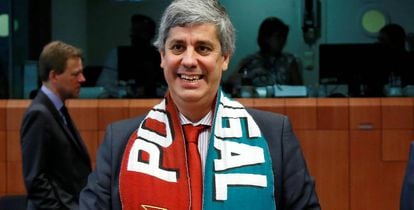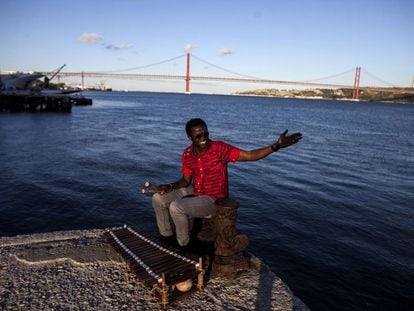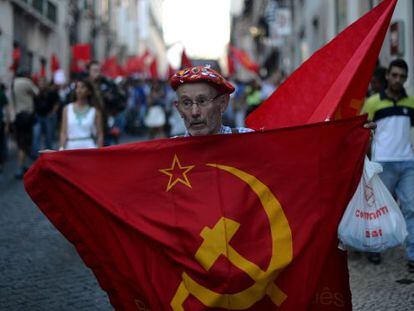How Portugal became the cool kid on the euro bloc
To the surprise of many, the unassuming country has won some of the world's top political posts

First it was the UEFA European Championship, then the United Nations, then the Eurovision song competition, and now the Eurogroup. This year, Portugal has swooped up huge wins to the puzzlement of many experts.
Besides its soccer prowess and singing talent, more surprising still has been the country’s dazzling ascent to the world’s top political posts – triumphs that speak more to Portugal's diplomatic skill than economic power.
In January, Antònio Guterres took over as secretary general of the United Nations, and this December, Mário Centeno will start presiding the Eurogroup, the meetings of finance ministers in the euro zone.
We have gone from being an ugly duckling to a radiant swan
Portugal's Prime Minister Antònio Costa
“We don’t bother anybody. Everyone is welcome in our country, nobody refuses to speak with us,” said Fernando Medina, the mayor of Lisbon, a few months ago. For the socialist politician, this was the reason why more tourists were coming to the city. “It may seem strange, but in the world we live in, being received with open arms has become very important.”
Portugal’s diplomats have used this friendly, pacifist attitude to help the country secure power in the world’s most important organizations. The former prime minister of Portugal, Durão Barroso, led the European Commission for 10 years (2004-2014), despite being unpopular with the people of Portugal and his very own Socialist Democratic Party (PSD).
The government of socialist prime minister António Guterres was also nothing to write home about. But soon after leaving the post, Guterres was elected as the UN High Commissioner for Refugees, a role he held for from 2005 to 2015. Portugal’s legion of diplomats then began the silent, almost secret legwork to maneuver Guterres into the top position.
“My experience as an international commercial arbitrator,” says lawyer and political commentator José Miguel Júdice, “is that often a small country that does not have power over others, instead has a balancing effect that others don’t have, so there are fewer misgivings.”
Between tyrants and Trojans, Portugal is the better pick. Neither from the south or the north, too red or too blue, and never the first option. Portuguese diplomats play at being the second choice.
“Portugal will without a doubt support Spain to lead the Eurogroup,” said Prime Minister António Costa just months ago. But Spain did not put itself forward. Now Portugal will push for the next vice president of the European Central Bank to be Spanish. The post is currently held by Vitor Constãncio, who, yes, is Portuguese.
When it came to pick the next UN secretary general, there was a push to choose a woman from the Eastern bloc. But Russia could not produce a winning candidate. So in the end it was Guterres, the champion of the second choice.
We don’t bother anybody. Everyone is welcome, nobody refuses to speak with us
Mayor of Lisbon Fernando Medina
In his acceptance speech, Guterres’s first words of thanks went to the Portuguese diplomatic corps. Here he revealed how each ambassador had been working in the shadows to win the support of the countries they worked in. But they were not simply asking for votes, but rather speaking and developing friendships with governing officials.
“In Portugal, a lot of things don’t work,” says political analyst José Manuel Fernandes. “But one thing that does work well is the diplomatic corps. It is one of the few bodies in the public administration that aspires to be an elite, and it has spent decades doing great work in the Foreign Affairs Ministry.”
The election of Mário Centeno as the leader of Eurogroup was no less surprising than the appointments of Barroso or Guterres. Centeno is the finance minister of a country that has been bailed out three times in the last 40 years. Between 2011 and 2014, Portugal was under the control of the so-called Troika. The Portuguese people quietly accepted a luxury tax on the basic bread with chorizo.
But unlike Barroso and Guterres, no one is accusing Centeno of being too politically correct. Since his election, Centeno has come down hard on the very people who voted for him, he has criticized the International Monetary Fund (IMF) and the Organisation for Economic Cooperation and Development (OECD), and accused the European Commission of taking the wrong path with its austerity measures for countries from the south – all affably, of course.
In 2015, it was Centeno who reacted the strongest against Dutch politician Jeroen Dijsselbloem’s comments that countries from the south spend bailout money on “alcohol and women.” But revenge is a dish best served cold.
Two years on, Centeno has become a leading European political figure. He speaks in Spanish to Guindos, in English to Dijsselbloem and in French to Moscovici. Be it the language, the discreet and polite manners, or the unassuming bid to be the second and not the first choice, it’s clear that 2017 will go down in history as the year that Portugal conquered the world. Prime Minister António Costa summed up the transformation on Monday: “We have gone from being an ugly duckling to a radiant swan.”
English version by Melissa Kitson.












































